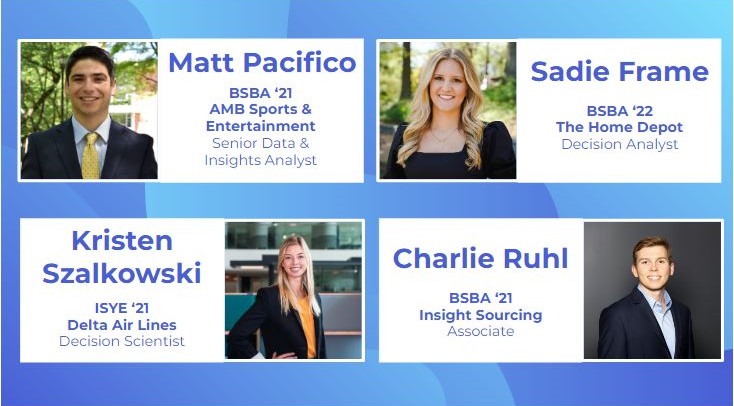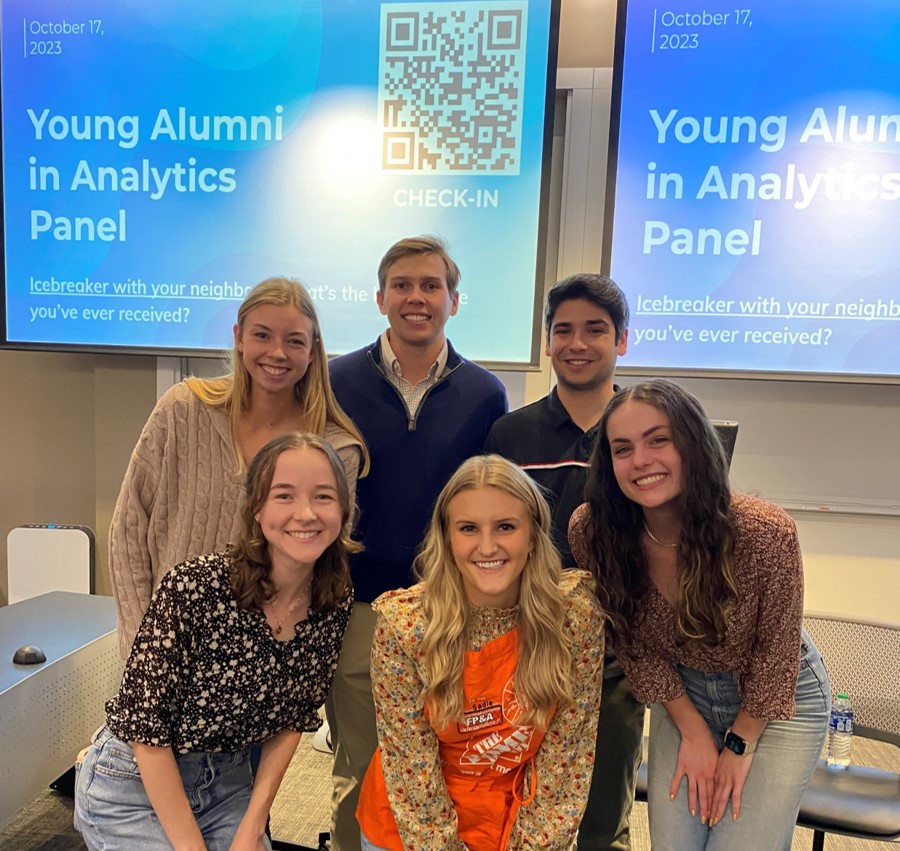Two years ago, Sadie Frame, Matt Pacifico, Charlie Ruhl, and Kristin Szalkowski were students at Georgia Tech, working hard to get that good job after graduation. Today, they are Georgia Tech alumni who love their jobs in business analytics—and appreciate the foundation for success they gained at Georgia Tech.
The four alumni recently returned to campus and spoke to members of the Undergraduate Business Analytics Club (UBAC), sharing what it’s like to work in business analytics and their thoughts about what it takes to succeed in the field.
“I think our first alumni panel was a great success,” said UBAC Co-president Caitlin Gorman. “The alumni had great, practical advice for us, talking about everything from the tools they use every day to the best way to make an impact when presenting to executives. However, what really stood out to me is how much they enjoy what they are doing. Although they’ve been in the workforce less than two years, they are already making a difference in their companies; I found that extremely inspiring.”
The Panel
 The panel members work at four very different Atlanta companies, but share a passion for data and how it can be used to transform business decisions.
The panel members work at four very different Atlanta companies, but share a passion for data and how it can be used to transform business decisions.
Panel Insights
The event lasted an hour and covered discussion topics ranging from how the panel members ended up in business analytics to what they are doing in their current roles to thoughts on business analytics and the future of AI. Excerpts from their comments include:
- Tell us about your career journey and how you ended up in business analytics:
Matt Pacifico: I pursued the business analytics certificate because I knew it would add value and I could use it to add impact wherever I landed. Then and now, I view business analytics as where the decisions happen and I knew I wanted to be a part of that decision-making process. AMB Sports & Entertainment is the parent company for the Atlanta Falcons, Atlanta United, and Mercedes Benz. We’re a small team so from the beginning, I was able to work on big projects; I feel extremely fortunate to have found my own niche in the sports analytics space where I can use data every day and see the positive results of my team’s efforts.
Sadie Frame: I worked for Georgia Tech football for two and a half years, which really sparked my interest in analytics. I loved seeing how real-time data could be used to improve the team—from player performance to team dynamics. I actually got my job at Home Depot through a class here at Georgia Tech, the undergraduate business analytics practicum (highly recommend by the way!) As part of the class, we were given data from a sponsor company and asked to solve the problem. We then presented our results to our corporate client as well as members of the Business Analytic Center’s Executive Council at the Business Analytics Practicum Showcase. While networking after the event, I met my current director and he hired me a few months later!
Charlie Ruhl: I started out with the finance concentration including a co-op in financial planning—not a lot of analytics there so I was a little bit of a late bloomer analytics-wise. I wanted to leave Georgia Tech with some hard skills and add a more technical aspect to my degree so I added the business analytics certificate.
Kristin Szalkowski: I actually started as a chem major, but switched to ISyE, mainly because I wanted a wide breadth of business knowledge. I didn’t go looking for a career in business analytics, but I absolutely love where I ended up. I work with five PhDs in operations research and optimization. My role is to act as the liaison between the highly technical work and the business partners who are highly skilled in the field, but don’t have a PhD in mathematics. My job is great for me because it is the perfect combination of highly technical information combined with relationship building and business outreach.
- What are some of the best parts of your job?
Matt Pacifico: I learn something new almost every day. My job combines the best of technology and business. It’s technical so I get to understand what’s going on behind the scenes, but I also get that face time with the people making the key business decisions. I also appreciate working on a small team, where we are constantly taking on many roles and the communication between us flows easily without any bureaucratic obstacles to getting things done.
Sadie Frame: The most rewarding part of my job is being able to talk to those business partners and show how we delivered what they needed to do their jobs better. Hearing their feedback about how we helped and made their jobs easier is extremely rewarding.
Charlie Ruhl: On the personal side, I love that I get to work with extremely smart and motivated people who care about doing the job right. On the business side, as a consultant, I enjoy working with different types of industry and solving new types of problems. It’s exciting, fun, and fast paced.
Kristin Szalkowski: In my job, I work with people from very diverse educational backgrounds—from PhDs to those with a high school education. What everyone has in common is a desire to work together to get the job done in the best and most cost-effective way possible. It’s a fun environment, and I learn something new every day!
- What are some of the important tools and software that you use?
Charlie Ruhl: Believe it or not, Excel. Alteryx is another one. It is a souped-up version of Excel that can handle data sets with millions of rows.
Sadie Frame: Sequel and Big Query on the tech side. But I actually think the soft skills are just as important. Communication is key. Working in business analytics, one of the most important skills is being able to communicate. So much of the knowledge I’ve gained has come from my team. I learned tips about Sequel from my senior director and another director gave me great intel about Tableau. I wouldn’t have been able to finish many of my first projects without the help of those around me.
Kristin Szalkowski: Sequel and Python.
Matt Pacifico: Sequel & Power BI.
- Advice for current students?
Sadie Frame: Find classes that get you involved in potential real-world scenarios to find out if you really enjoy business analytics. If you only like the data side, concentrate more on data science. Take classes that emphasize working on group projects because when you’re in the real world, that’s all you do, work on projects with your team.
Matt Pacifico: If you’re going down the business analytics route, don’t forget the business aspect of it. When you have someone who is good at the data stuff, but can’t communicate, it makes the team look bad. Take on all the group projects that you can. You’re going to learn Sequel and Python and that ‘s good, but also make sure you learn the best way to communicate your results. That’s the most important part—learning to anticipate the questions you’re going to get—why you made an assumption or why the data looks like it does.
Kristin Szalkowski: Classes that contain coding skills are super helpful. I took one in R and one in Python which have really helped me out. Also, when you do present to executives, know your audience. I currently work with two vice presidents. One is “Give me all your high-level facts,” and the other is “I want to see all of the mathematical equations used and where your data sources come from.” I’ve learned it’s extremely important—and effective—to tailor your presentation to your stakeholders!
- Pick one single skill—hard or soft—that you learned at Georgia Tech that you have found to be most valuable in your work:
Matt Pacifico: Working in teams.
Charlie Ruhl: I would say visualization, the ability to transform your data into a compelling story so you can deliver key takeaways to your audience. That’s really important in business.
Kristin Szalkowski: Problem-solving.
Sadie Frame: Communication. If you can’t tell the story of your analytics properly and effectively, then you’ve wasted someone’s time.
